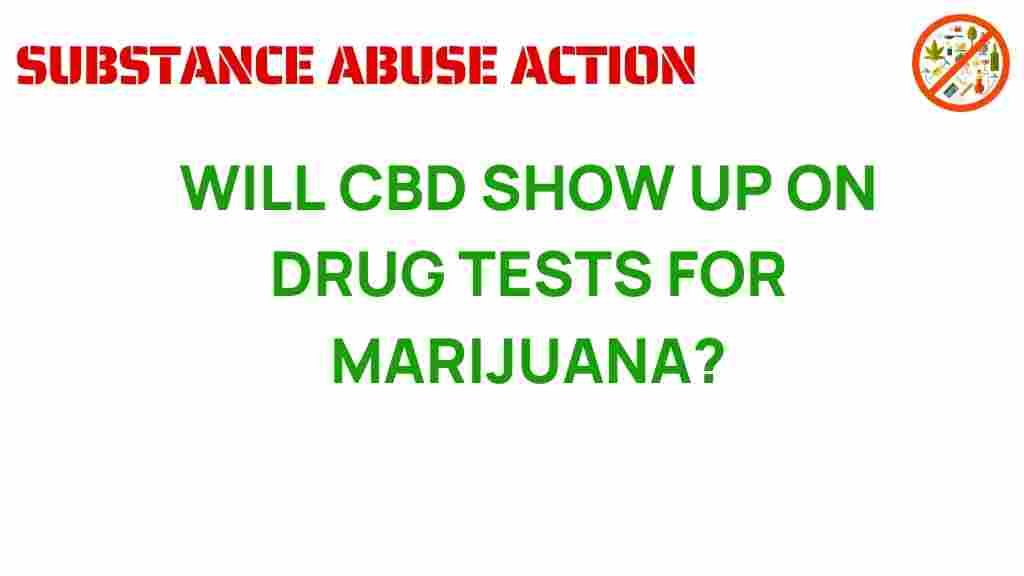Will CBD Really Show Up on Drug Tests for Marijuana? What You Need to Know
In recent years, CBD has gained immense popularity due to its potential health benefits and legal status in many regions. However, a common concern among users is whether CBD will show up on drug tests for marijuana. This article will provide clarity on this issue, discuss the differences between CBD and THC, and explore the legality of these cannabinoids, especially in relation to workplace testing.
Understanding CBD and THC
Before diving into the implications for drug tests, it’s essential to understand the key differences between CBD (cannabidiol) and THC (tetrahydrocannabinol).
- CBD: A non-psychoactive compound derived from hemp. It is celebrated for its potential therapeutic effects, including relief from anxiety, inflammation, and chronic pain.
- THC: The psychoactive component of marijuana, responsible for the “high” sensation. THC is often the primary target in drug testing.
Both CBD and THC are cannabinoids, but their effects and legal statuses vary significantly. Understanding this distinction is crucial for anyone concerned about drug testing.
The Legality of CBD and THC
The legality of CBD and THC largely depends on the source and concentration of these compounds:
- Hemp-derived CBD: Legal in many places, provided it contains less than 0.3% THC.
- Marijuana-derived CBD: Legal in some states, but primarily where marijuana is legalized for recreational or medicinal use.
It’s important to check local laws as they can vary significantly. Always ensure that you’re using products that comply with the legal requirements in your jurisdiction.
How Drug Tests Work for Marijuana
Drug tests for marijuana typically screen for the presence of THC and its metabolites, not CBD. However, there are some important considerations:
- Standard Drug Tests: Most drug tests, especially those used in workplace testing, are designed to detect THC, not CBD.
- False Positives: Some CBD products may contain trace amounts of THC, which could potentially lead to a positive test result.
Understanding how drug tests work is crucial when considering the use of CBD products.
Types of Drug Tests
There are several types of drug tests commonly used:
- Urine Tests: The most common form of drug testing, which can detect THC metabolites for days or weeks after use.
- Blood Tests: Less common, but can detect THC in the bloodstream for a shorter period.
- Saliva Tests: Can detect THC for a few hours to a couple of days after use.
- Hair Tests: Can show THC use for up to 90 days, but are less frequently used.
Each type of test has its own detection window and capabilities, which can affect the likelihood of testing positive.
Will CBD Show Up on Drug Tests for Marijuana?
The short answer is that CBD itself typically will not show up on standard drug tests for marijuana. However, there are nuances to consider:
- Full-spectrum CBD: These products contain a wide range of cannabinoids, including trace amounts of THC. If consumed in sufficient quantities, they may trigger a positive drug test.
- Isolate CBD: This form contains pure CBD with no THC, making it less likely to cause issues during drug testing.
Factors Influencing Drug Test Results
Several factors can influence whether CBD will affect drug test results:
- Product Quality: The purity and concentration of the CBD product can vary. Always choose products that provide third-party lab results.
- Dosage: Higher dosages of full-spectrum CBD might increase the risk of testing positive due to cumulative THC levels.
- Frequency of Use: Regular use of CBD products that contain THC can lead to higher accumulation in the body.
Step-by-Step Process: How to Avoid Positive Drug Tests
For those concerned about drug testing while using CBD, here’s a step-by-step guide to mitigate the risk:
- Choose CBD Isolate: Opt for products labeled as “CBD isolate” to ensure no THC is present.
- Read Labels Carefully: Look for products that provide clear information about their cannabinoid content.
- Request Lab Results: Always check for third-party lab testing to confirm the product’s contents.
- Limit Dosage: Use the lowest effective dose to minimize the risk of THC accumulation.
- Know Your Workplace Policies: Familiarize yourself with your employer’s drug testing policies and procedures.
Troubleshooting Tips for CBD Users
If you’re a CBD user concerned about drug tests, here are some troubleshooting tips:
- Consult a Healthcare Professional: If you’re unsure about the effects of CBD on drug tests, speak with a healthcare provider.
- Keep Track of Usage: Maintain a record of the CBD products you use, including the brand and batch numbers.
- Consider Timing: If you know a drug test is coming up, consider stopping CBD use a few weeks prior to minimize risk.
Common Misconceptions About CBD and Drug Testing
There are many misconceptions regarding CBD and drug tests. Here are a few of the most common:
- Myth: All CBD products contain THC. Reality: Many CBD products are THC-free, especially isolates.
- Myth: CBD will always show up on drug tests. Reality: CBD itself is not typically tested for.
- Myth: You can’t use CBD if you are subject to drug testing. Reality: With careful selection, it is possible to use CBD responsibly without risk.
Conclusion
In conclusion, while CBD typically does not show up on drug tests for marijuana, the presence of THC in some CBD products can lead to positive test results. Understanding the differences between CBD and THC, knowing the legal landscape, and selecting high-quality, THC-free products can help mitigate the risks associated with drug testing.
When in doubt, always consult with a healthcare professional and stay informed about the products you choose. For more information on CBD and its effects, check out resources like the National Center for Biotechnology Information.
For additional tips on CBD usage and workplace policies, visit our comprehensive guide on cannabinoids.
This article is in the category Health and created by SubstanceAbuseAction Team
